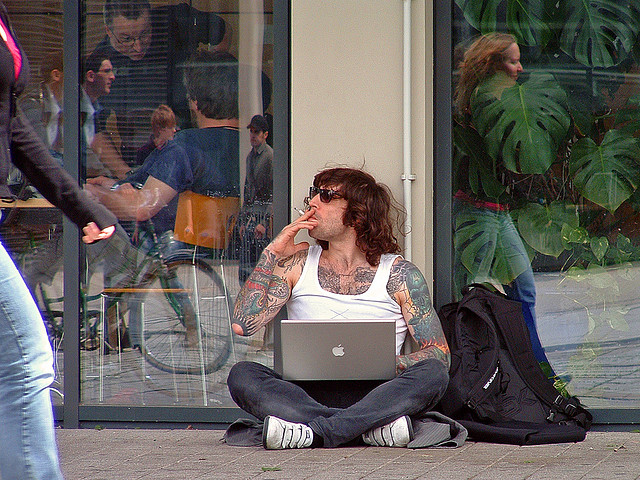From the top of Mt. Tolmie the lights of Victoria, British Columbia extend like an exodus of fireflies following the contours of the coast.
The hum of light pollution simmers in the rain, making it visible.
Next to me [ X ] reflects on how strange it would be to have lived in a time when, looking out from our vantage, we would see only abundance—flocks of birds, herds of deer, wilderness—instead of this blanketed frenzy of orange stars laid out in buildings, homes, and street-lamps.
What would an early First Nations hunter think if we could bring him here, to this moment?
So, every one of those lights represents at least one person?
Where do they get all their food?
Oh, you see that small reddish light over there? The one that that says Wal-Mart? All your food comes from there.
Welcome to the disconnect.
Understanding where we’ve arrived requires the presence of a history—but a history isn’t simply a chronological order of events. For millennia it has existed as a cultural compass, one which orients us according to a shared language, cosmogony, and stories.
And for millennia, this story has been one of balance: take only what you need.
There have been—arguably—two dramatic cultural paradigm shifts, and they were both concurrent with the advancement of a new technology, a new way of knowing. The first was the development of literacy in Greece, which brought us out of the oral age and into a literate one. It solidified our stories, cemented laws in the inexorable medium of print. It gave us a retrievable format for our history.
The second paradigm shift would follow the invention of television. Enter post-modern society.
Now, this is a society which has often, and most pugnaciously, been denoted by the concept of progress. Rhetoric we’re all familiar with; infinite growth under conditions of finite resources.
There are obvious consequences—economically, socially, even spiritually.
In adhering to the Judeo-Christian tenets of contemporary culture, the side-effect most often overlooked is its genocide of stories.
The death of a central mythology. And with it, the death of a unifying history. What does this mean for us?
By turning away from a primitive oral descent—by overextending and obsoleting literacy’s function—by embracing the stimulative reality of television and computers, we’ve now entered into a virtual age. One in which the function of stories is non-existent, or has been replaced by non-linear and irrelevant anomalies: rites of initiation are replaced by Facebook, codes of ethics are underpinned by entertainment, and old ways of knowing become distorted.
In our hurry to catch up to our own evolution, we skipped a beat.
As a species, our principle adaptation has been tool construction (techne), so our reliance on it is an understandable feature. But when our blind faith in technology becomes married to the idea of progress, to non-renewable and destructive forces, then they end up bulldozing every original and established mythology.
When I say virtual culture, I am making several important distinctions between its oral predecessor. The fundamental basis of an oral culture is the ingrained history it contains, a linear recognition of past events (natural, supernatural) and people (heroes) that supply exemplary models of behavior and codes of morality. In an oral culture, there is always a ‘map’ or set of instructions for an individual to personally access in order to navigate the world.
By comparison, virtual cultures resist historical representation. By denying itself a shared history it denies itself a beginning. It is non-linear, and its primary concern has more to do with the present or the future then the pas—these days we are beleaguered by a gradual protraction of our attention spans, the use of text-speak, the obsessive-compulsive need to update statuses or indulge in Twitter.
We strive to satisfy basic social and spiritual needs but find them further diminished by the virtual substitutes at our disposal.
The concepts of virtuality and progress are alike in that neither is sustainable, and neither functions according to a natural law of equilibrium. We’ve seen how progress depletes resources like oil, timber, wildlife, etc. Virtuality also depletes resources, but on a personal level. How many long-term relationships now begin online with dating sites?
How many of our interactions with other human beings take place through a virtual medium?
In a study (1) that tracked different Facebook users and their levels of activity online, without exception the group that displayed the most activity also scored the lowest in terms of how happy or self-fulfilled they felt—like many virtual mediums, the information that users choose to display or make public on their Facebook is subjectively oriented.
We can choose what we want other people to see, and this allows us to construct virtual selves that may not correspond to our actual selves. The higher-activity Facebook users–those who updated or checked their page constantly—had decreased self-esteem and notably lower opinions of themselves.
The profiles they were consistently viewing of others appeared to depict individuals who were happier and more successful than they were. Transparency takes the back seat in favor of the idealized virtual versions of ourselves we want others to see.
Again: The disconnect.
In this state, we are suddenly less than what we were. More and more, our social and emotional wellbeing becomes supplemented by Internet and cellphones. Community, as a concept and as a practice, loses its coherence. We begin to suffer a dislocation, not only from our environment and other people, but from our own idea of self. In many ways, we’re already there.
Oral cultures protect the interests of their congregation. Virtual cultures, lacking history or context, can be programmed and re-programmed. The advertisement industry, entertainment media, news outlets all pander to this flexibility. And herein lies the real danger: politics and economics can be (and are) influenced in a culture susceptible to this kind of hi-jacking.
The moralities and values of a society can be re-written according to the self-interests of those capable of wielding a programmer.
Earlier, in response to reading yet another article about the Enbridge pipe-line development and its attempt to access First Nations heritage lands, I offhandedly told [ X ] that I could only see two definitive methods of directly producing change. One, the violent, selective, and deliberate revolt by a majority charged with feelings of injustice. The other, to approach it with pragmatism, to work within the confines of the legal system, employed by the elite to create “ordered control,” in order to trap or undermine corruption at its own game.
[ X ] calmly responded, “Why not give them an alternative?”The simplicity of his answer startled me. Why not? That is what we’re doing, and what many people have been doing, quietly, behind the scenes. Reclaiming stories.
The revitalization of the back-to-land movement, people learning how to grow their own food, igniting conversation about alternative methods of living, developing alternative sources of power, revoking dependence on corporate and capitalist beneficiaries. The active re-acquisition of practical skills. Calling out corruption and self-interest at its core. Embracing technology conscientiously, but remaining vigilant and wary of our dependence on it.
All of these are methods of story-telling, insofar as they are teaching and transmitting the basis for another “way of being,” by propagating ideas and encouraging a full and vital participation in them.
In the finest tradition of an oral culture.
So yes, our addiction to virtuality is endemic. But I refuse to believe its terminal, so long as we find strength in the creative ambitions of our artists and writers and thinkers. So long as we have a capacity for meditative thought and a healthy suspicion of the status quo. In a mythological context, this means succumbing to an anamnesis: a remembering of old ways, ancient codes of ethics, and the ability to integrate with our environment harmoniously.
At the same time, it also means fighting back against complacency—the myth of comfort.
We’ve got a long ways to go.
We’ve got a lot of work to do.
Notes:
1 “Facebook Use Predicts Declines in Subjective Well-Being in Young Adults.”
Author: Jordan Mounteer
Editor: Renée Picard


 Share on bsky
Share on bsky





Read 0 comments and reply